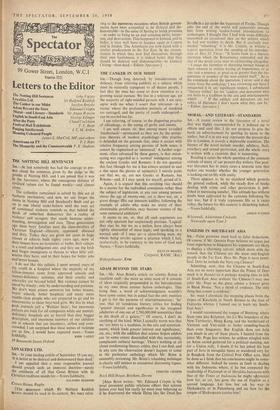Letters to the Editor
The Notting Hill Sentences John Vaizey
Loyalties Ltd. Sir Half ord Reddish The Canker in our Midst Jocelyn Brooke Adam Beyond the Stars Edmund Crispin Moral--and Literary—Standards Sir Angus Watson English in South-East Asia George Edinger After the Party Claud Cockburn Festival Hall Exhibitions T. E. Bean Purging Intellectuals J. E. M. Arden Housing Coloured People James E. MacColl, MP. and others
Americana on TV - P. J. Hart The Monarchy and the Commonwealth P. K. ‘I 1 Commonwealth . . ..... ..',1(1.1(111i . THE NOTTING HILL SENTENCES last somebody has had the courage to pro- test about the sentences given by the judge to the youths at Notting Hill, and I am proud that it was . in the Spectator, where the courageous defence of civilised values can be found weekly—and almost alone.
The collective conscience is salved by this act of barbaric retribution; and now we can forget the slums in .Notting Hill and Shepherd's Bush and go on in one liberal make-believe until the next act of communal violence reminds us that behind the mask of suburban democracy lies a reality of violence and savagery that needs humane under- standing, investigation and cure. Three generations ago these boys' families were the slum-dwellers of Victorian England—illiterate, oppressed, diseased and dirty. Today they are given ten years in huge classes at schools built eighty years ago; most of their houses have no lavatories or baths; their culture is a cruel and belligerent one; and they see the Irish and Negro immigrants as threats to what little self- esteem they have, and to their hopes for better jobs and better houses.
1 do not like this culture. I spent several years of my youth in a hospital where the majority of my fellow-inmates came from approved schools and mental-deficiency colonies, and their cruelty and amorality are beyond belief. But violence cannot be cured by cruelty; only by understanding and patience. We don't want prison sentences but better houses, better schools, better hospitals and many more middle-class people who are prepared to go and be missionaries to these boys und girls. We live in what posh journals call a 'Welfare State'; but 'enormous palaces are built for oil companies while our mental- deficiency hospitals are so horrid that they beggar description, and enormous numbers of our children are in schools that are insanitary, airless and over- crowded. I am surprised that these scenes of violence are so few; I would have expected more.—Yours 19 Beaumont Street, Oxford


































 Previous page
Previous page